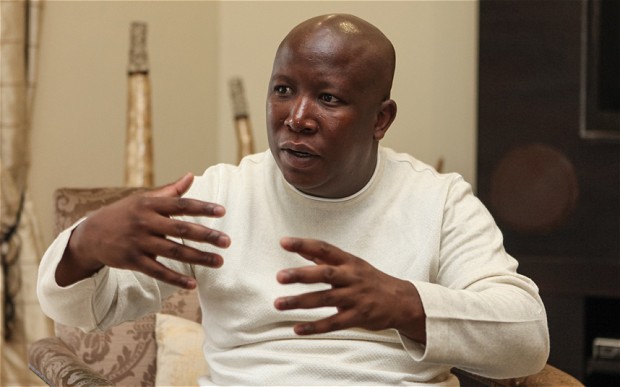SA shifts focus to 2016 municipal elections

Setumo Stone
SOUTH Africa’s metropolitan municipalities have been marked out as the battlefields for the 2016 municipal elections, given voting patterns in those areas in last week’s national poll. The urban middle and upper class vote is increasingly slipping away from the governing African National Congress (ANC), and the party’s performance in the eight big-budget municipalities continues to be below the national tally, which this time was 62,15 percent.
The exceptions were Buffalo City 68,04 percent, eThekwini 65,39 percent and Mangaung 64,11 percent.
The ANC has no answers yet, and secretary-general Gwede Mantashe says an analysis of the results in troubled metros is in the pipeline:
“We’ll have to go back.”
In Gauteng, the highly contested ANC-run province with South Africa’s three biggest metros, the ANC has shown it is vulnerable.
The ANC won the province by 55 percent, a significant drop from 65 percent in 2009. The ANC won Johannesburg, Tshwane and Ekurhuleni by 53,63 percent, 50,96 percent and 56,41 percent, respectively.
Nelson Mandela Bay became the second metro, after Cape Town in 2006, where ANC support dipped below 50 percent — falling to 49,17 percent from 51,91 percent in 2011 and 50,14 percent in 2009.
Fewer people in Nelson Mandela Bay voted for the ANC last week (215,922) than in 2009 (227,861).
The drop is in line with the overall voter trend in the area, as 444,999 people cast their votes last week, against 460,123 in 2009. But those voting for the opposition, especially the Democratic Alliance (DA), flocked to the polls.
The tension between the ANC and the National Union of Metalworkers of South Africa (Numsa) — which for the first time refused to endorse the ANC over policy differences and withdrew its financial support — would not have helped. Port Elizabeth, the hub of South Africa’s automotive industry, is a Numsa stronghold.
This creates new possibilities for 2016, considering the opposition has already shown the stamina to use the control of a big metro as a launch pad to take over a province, as happened in the Western Cape in 2009, after the DA wrested Cape Town from the ANC in 2006.
All things remaining the same in 2016, the ANC could be pushed into a coalition government. This would make Julius Malema’s Economic Freedom Fighters (EFF), at 4 percent, a potential kingmaker, considering the Congress of the People, at 2 percent, is fast facing extinction.
But the ANC has not fared well in coalition arrangements, evident in the continuous falling-outs with councillors of the National Freedom Party, a splinter from the Inkatha Freedom Party, in several municipalities in KwaZulu-Natal since the 2011 municipal elections.
Alternatively, the DA, at 40 percent, would be in a position to lead a coalition government of opposition parties. The fly in this ointment is that the DA and the EFF have declared a coalition between them to be impossible.
The situation bodes well for the opposition but poses a challenge for the ANC, with voters clearly picking up that all is not well with the party in Nelson Mandela Bay, and that this is affecting the municipality’s ability to deliver services.
Most significant was a long-running war between ANC bosses in the region and the party’s former mayor, Zanoxolo Wayile, replaced by octogenarian Ben Fihla in March last year.
As a result, the municipality has for years been without a permanent municipal manager.
Lindiwe Msengana-Ndlela resigned in July after just five months on the job, amid allegations of political interference in her work.
Eastern Cape ANC spokesman Mlibo Qoboshiyane says the party is looking to revitalise its structures on the ground. Qoboshiyane says apathy was higher than expected in Nelson Mandela Bay, particularly considering it is a metro.
“A clearer position would emerge from detailed analysis of voting trends,” he says.
Political analyst Somadoda Fikeni says “the key story to this election is that the ANC consolidated its rural and small town base. But it also lost ground in big metros except for Durban”.
He says the party will be vulnerable come the next election.
Reasons for the loss of support in metros may vary from place to place, he says. In Gauteng, disgruntlement with the e-tolling scheme cannot be underestimated.
Likewise, “the tension between the ANC leadership in the province and government; as well as the subtle tension between Luthuli House and the Gauteng ANC leadership”.
The DA’s Eastern Cape leader, Athol Trollip, says the opposition is “going to throw everything we have into winning this municipality”.
Trollip says the DA has “smelt blood” as the ANC is clearly weakening. He says the DA campaign will start with two upcoming by-elections in Nelson Mandela Bay, which the party “will win”.
ANC national executive committee member Lindiwe Zulu says it is important that the ANC acknowledge it has challenges in certain areas and attend to them.
“We will not bury our heads in the sand.”
This story appeared originally on BDlive











Comments